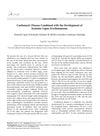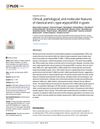7 citations,
February 2017 in “The American journal of medicine” People often have iron deficiency after weight-loss surgery, which can cause symptoms like hair loss and dizziness, and iron levels should be tested to diagnose it.
 September 2022 in “Curēus”
September 2022 in “Curēus” The removed ovarian tumor was a rare type of blood vessel tumor that improved the patient's symptoms and hormone levels after surgery.
 November 2022 in “Journal of the Endocrine Society”
November 2022 in “Journal of the Endocrine Society” Always consider xanthomatous hypophysitis before deciding on pituitary surgery.
June 2023 in “CHEDS Journal of Chemistry Education and Science” Green spinach leaves can be an effective and liked hair tonic for hair loss.
PRP hair treatment is generally safe but may cause minor pain, bleeding, redness, and scalp tightness, and isn't suitable for everyone.
 3 citations,
June 2013 in “Turkish Journal of Rheumatology”
3 citations,
June 2013 in “Turkish Journal of Rheumatology” A 16-year-old boy with Castleman's disease and lupus was successfully treated and showed no recurrence.
1 citations,
January 2009 in “Kidney International” The woman was diagnosed with systemic lupus erythematosus (SLE) after initial misdiagnosis and improved with proper treatment.
 December 2023 in “International Journal of Research in Dermatology”
December 2023 in “International Journal of Research in Dermatology” Halo Scalp Ring is a rare newborn hair loss that can be missed, and early diagnosis can avoid extra tests and worry for parents.
 2 citations,
August 2024 in “International Journal of Dermatology”
2 citations,
August 2024 in “International Journal of Dermatology” Adipose stem cell-derived exosomes are safe and effective for hair regrowth in AGA patients.
 1 citations,
January 2021 in “Nihon rinsho hifukaikai zasshi”
1 citations,
January 2021 in “Nihon rinsho hifukaikai zasshi” The document provides ways to tell alopecia areata from other similar hair loss conditions, using visual checks and specific tests.
 September 2023 in “Journal of Parasite Science”
September 2023 in “Journal of Parasite Science” The dog's skin condition improved significantly after seven days of treatment.
 8 citations,
February 2005 in “Veterinary dermatology”
8 citations,
February 2005 in “Veterinary dermatology” Chesapeake Bay retrievers' hair loss is likely a breed-specific, hereditary condition linked to abnormal steroid levels and distinct skin changes.
 February 2021 in “Endocrinology, diabetes & metabolism case reports”
February 2021 in “Endocrinology, diabetes & metabolism case reports” A postmenopausal woman's excessive hair growth and hair loss were due to a non-cancerous ovarian condition, treated successfully with surgery.
 September 2023 in “International journal of Unani and integrative medicine”
September 2023 in “International journal of Unani and integrative medicine” Hair loss patterns are linked to temperament and can help diagnose it.
 16 citations,
August 2004 in “Tetrahedron”
16 citations,
August 2004 in “Tetrahedron” Scientists made all eight versions of a compound called cyoctol, but found it's not an anti-androgen and it fully breaks down in the skin.
1 citations,
January 2022 in “Italian journal of dermatology and venereology” The combination of arginine and zinc reduces hair loss and increases hair growth effectively.
 4 citations,
July 2013 in “Journal of Dermatological Science”
4 citations,
July 2013 in “Journal of Dermatological Science” Pregnancy right after giving birth in mice lacking IL-10 causes milk that leads to liver issues and hair loss in their babies.
December 2009 in “한국인체미용예술학회지” The herb extract helped prevent hair loss and promote hair growth.
 22 citations,
November 2011 in “Journal of Analytical Toxicology”
22 citations,
November 2011 in “Journal of Analytical Toxicology” Scientists have developed a new method to detect steroid abuse in athletes using cell-based tests, which could be the future of anti-doping methods.
 March 2015 in “CRC Press eBooks”
March 2015 in “CRC Press eBooks” Telogen effluvium is a type of hair loss in women caused by many factors, and iron and thyroid tests are recommended for diagnosis.
 7 citations,
October 2020 in “Dermatology practical & conceptual”
7 citations,
October 2020 in “Dermatology practical & conceptual” Some skin, hair, and nail supplements can be toxic, interact with medications, affect lab tests, and may increase cancer risk.
 12 citations,
January 2009 in “Gynecological Endocrinology”
12 citations,
January 2009 in “Gynecological Endocrinology” A postmenopausal woman's hair loss and excess hair growth improved after surgery for ovarian hyperthecosis.
 November 2023 in “The Bovine practitioner”
November 2023 in “The Bovine practitioner” A bull got very sick and had to be put down after eating hairy vetch for months.

Orchiectomy and melatonin helped a German Spitz regrow hair lost due to alopecia X.
 December 2022 in “European journal of internal medicine”
December 2022 in “European journal of internal medicine” Hair straightening treatments can cause serious kidney damage, especially if you have skin issues.
 5 citations,
May 2018 in “PloS one”
5 citations,
May 2018 in “PloS one” Both classical and L-type atypical BSE from cattle can infect goats with different incubation times, and tests can distinguish between the two strains.
 October 2024 in “Journal of the Endocrine Society”
October 2024 in “Journal of the Endocrine Society” A rare ovarian tumor caused high testosterone in a postmenopausal woman, resolved by surgery.
 October 2024 in “Journal of the Endocrine Society”
October 2024 in “Journal of the Endocrine Society” Rare ovarian tumors can cause hyperandrogenism, even if imaging appears normal.
 October 2024 in “Journal of the Endocrine Society”
October 2024 in “Journal of the Endocrine Society” Bilateral salpingo-oophorectomy resolved hyperandrogenism in a postmenopausal woman with rare ovarian tumors.
1 citations,
January 2009 in “The Korean Society of Beauty and Art” Korean Wild Ginseng extract may increase hair thickness and satisfaction among users, but not significantly increase hair count.






















